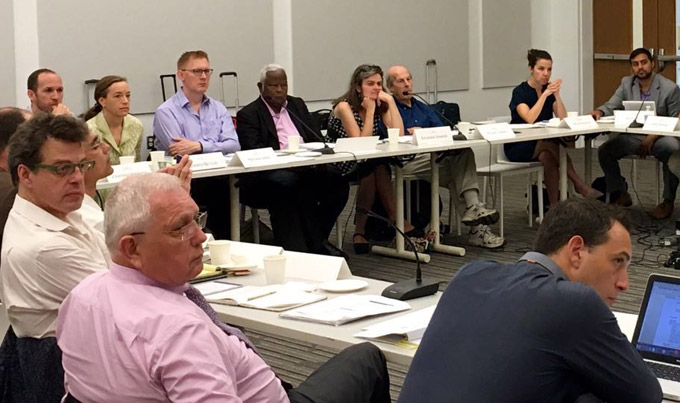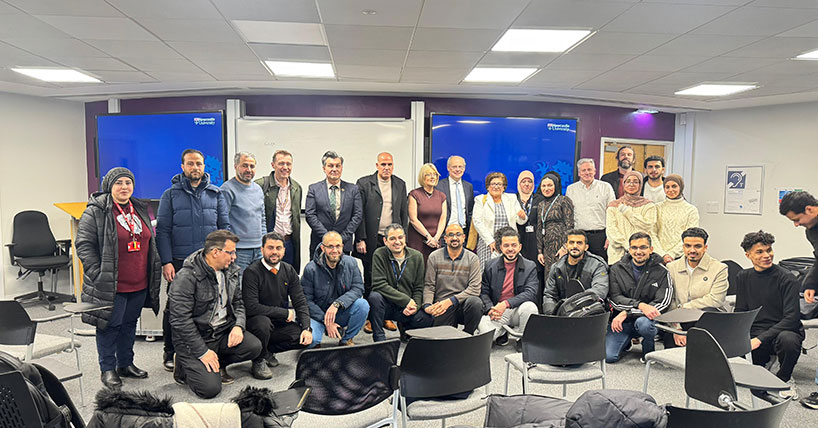United Nations anti-torture meeting
Forensic psychologist supports UN's call for anti-torture interviews
Published on: 31 October 2016
A forensic psychologist from Newcastle University has played a vital role in getting the United Nations to call for a universal protocol for anti-torture interviewing techniques.
In many parts of the world, the use of torture, coercion, and intimidation against people in custody and during questioning in criminal investigations continues to be used to gain a confession to a crime.
These abusive and confession-driven techniques are against human rights and are known to often obtain false and unreliable information, leading to wrongful convictions and miscarriages of justice.
Dr Gavin Oxburgh, Director of the Forensic Interview Laboratory at Newcastle University’s School of Psychology, met United Nations’ Special Rapporteur on Torture, Professor Juan E. Méndez, to discuss the development of a protocol and universal set of standards for non-coercive interviewing methods and procedural safeguards.
The aim of the protocol is to ensure that no person is subjected to torture, ill-treatment or coercion when being questioned by police and law enforcement agencies.
A two-day UN consultation was held at Washington Law School, in Washington D.C, where 33 experts from around the world attended, representing countries such as the USA, UK, Ukraine, South Africa, Norway and Switzerland.
Three of the experts were members of the International Investigative Interviewing Research Group (iIIRG), an international network of interviewing professionals, which was founded by Dr Oxburgh and Assistant Chief of Police Trond Myklebust from the Norwegian Police University College, Oslo, in 2007.

Universal protocol needed
Professor Méndez has now called upon States to spearhead the development of a universal protocol aiming to ensure that no person is subjected to torture, ill-treatment or coercion during police or law enforcement interviews.
Dr Oxburgh said: “There are countries around the world that continue to use interrogation techniques and torture individuals in order to elicit information and to gain confessions.
“This is a clear breach of a person’s human rights and it should never be allowed to happen, under any circumstances.
“It is important to establish a universal protocol of interviewing techniques that are within the fundamental principles of international human rights law, being ethically sound and based upon scientific research.
“The UN consultation identified a set of standards for non-coercive interviewing methods that, as a matter of law and policy, should be applied at a minimum to all interviews worldwide.
“Our guidance moves away from accusatory, manipulative, confession-driven techniques and provides information on how to operate the presumption of innocence in the pursuit of truth.”
Experts say that an official protocol must be steeped in the main principles of international human rights law and prohibit torture and ill-treatment.
Non-accusatory technique
It is recommended that a non-interrogative interviewing technique is used as a way to gather information from a suspect, witness or victim of crime.
Such a technique, known as the PEACE model, has been used in England, Wales, and other countries since the early 1990s, and it is highly successful.
PEACE stands for Preparation and planning; Engage and explain; Account, clarify and challenge; Closure; Evaluation.
Dr Oxburgh added: “This model is a non-confrontational approach and is conversational in tone. It is ethical and non-aggressive which helps to reduce the number of false confessions.
“A significant amount of scientific research has been conducted which looks at best interview techniques and Professor Méndez was keen to hear about recent studies in this area, including my own on the use of empathy in investigative interviews.
“Many international organisations, including divisions of the United Nations, the International Criminal Court at The Hague, and the South African Police Service, have already received training in the PEACE model of interviewing by the iIIRG.
“It was a great honour and privilege to be invited to contribute to the United Nations discussion and it shows that the research carried out at Newcastle University and by members of the iIIRG into this field is well respected internationally.”
Dr Oxburgh has recently co-edited two books in the area of investigative interviewing and is regarded as a leader in his field.
It is now hoped that Member States of the UN will lead on the development of a universal protocol, under the support of the UN, and with a wide range of organisations, including civil society, law enforcement and academia.
To view the report: Torture and other cruel, inhuman or degrading treatment or punishment, click here



